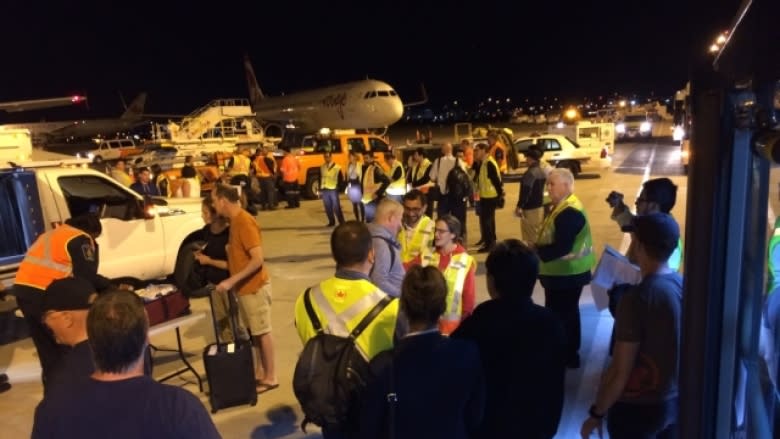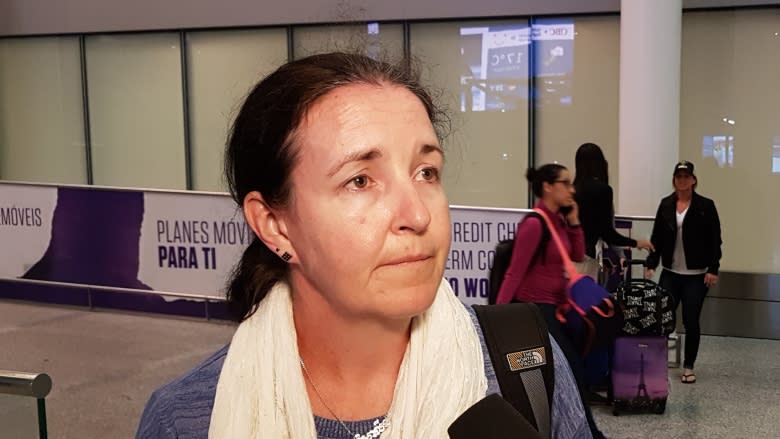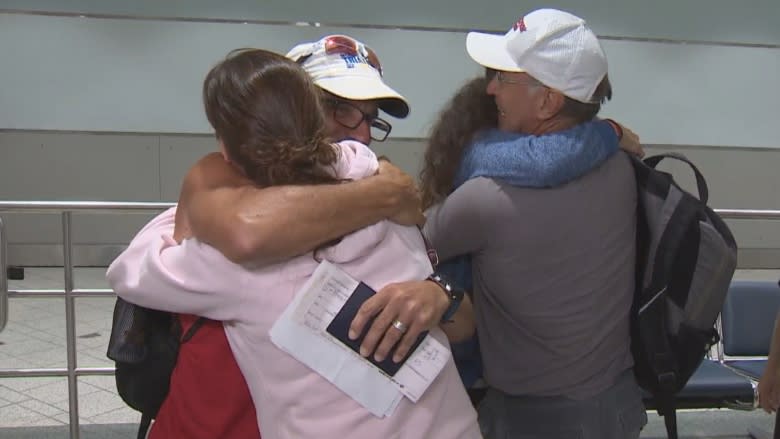Canadians evacuated from Caribbean finally home after gruelling week
They spent days holed up in shelters, schools and homes, slammed by violent winds and heavy rain as a monster storm bore down on them, and now they're finally coming home.
Three planeloads of Canadians stranded for days in the Caribbean in the wake of Hurricane Irma arrived in Toronto Monday night — weary, exhausted and relieved.
Air Canada Flight 1997 from Turks and Caicos touched down at Toronto's Pearson International Airport just after 9 p.m. ET, one of three commercial flights marshalled to rescue about 250 Canadians stranded in the region.
Two WestJet flights, 4906 from St. Martin and 4902 from Turks and Caicos, both arrived several hours later.
'There was nothing left'
Rosaleen Murphy was among those arriving on the Air Canada flight. She had moved to Turks and Caicos on Aug. 18 and started a new job as a teacher last Monday. Three days later, the hurricane hit.
As the storm walloped the island, Murphy said, she hid out in a cupboard underneath the kitchen sink of the home she'd rented in Turtle Cove.
When she emerged, she said, the roof and walls were gone. "There was nothing left, at all," she said.
The arrivals come after family members and colleagues of many of those stuck in the area expressed desperation and complained that they felt abandoned by the federal government, saying its response was lacking compared with other countries that deployed military aircraft to get their citizens out.
Todd Chisholm is a teacher who was staying at the Caribbean International Academy, a private school in the low-lying western reaches of St. Maarten, the Dutch part of the island of Saint Martin.
"It was about four or five days of being on edge, not sure who was taking care of us," he told reporters gathered at the airport.
"There were many of us Canadians sitting there feeling we were stranded."
Chisholm travelled to St. Maarten with about a dozen other teachers. He said that once Irma encapsulated the island, internet access and cell coverage was largely lost, so getting accurate and timely information was a struggle.
Monday morning at around 11:45 a.m. ET, the group received a text message telling them to be at the airport for 12:30 p.m. While he felt deeply grateful to be home, Chisholm said the island will need a lot of time to fully recover.
"You cannot explain it. The island was devastated," he reflected.
WestJet said 70 Canadians and 25 Americans were aboard its rescue flight from the island of Saint Martin. Asked if there were any Canadians who wanted to board but were left behind, airline spokesperson Lauren Stewart said she believed everyone who needed evacuation was able to leave.
Questions about Ottawa's response
Earlier in the day, the airline announced it was taking "the unusual step" of reaching out to stranded travellers in Saint Martin using its social media channels. "We wanted to make sure that anyone needing to leave was able to get out," Stewart said.
Aamir Saiyed, a Toronto medical student who narrowly escaped the storm before it swept Saint Martin, said 11 Canadian students who rode out the aftermath of the storm holed up at the American University of the Caribbean School of Medicine were on the WestJet flight. Some 50 others, including students, faculty members and their families, were flown out on a plane chartered by the school, he said.
In the days since the monster storm moved through the region, the U.S. used military planes to get 1,200 Americans out of the Caribbean. The Netherlands and the U.K. also brought home their citizens with military planes.
Minister of Foreign Affairs Chrystia Freeland responded to that criticism Monday, saying the Air Canada flight heading back to Toronto Monday had landed in Turks and Caicos on Sunday, bringing humanitarian aid. But because of "complications," the plane couldn't return until the following day.
Freeland described the situation as "very chaotic, very difficult," saying she was glad people were coming home.
"I think we have to remember that there are people for whom that is home, they have no other home to come back to," she said Monday.
Freeland was at Pearson Monday night greeting those arriving, who were given a flyer with a similar message:
"I know that we can always do better," read the message directing people to an email address to leave feedback. "If you would like to share your story, please do so."



